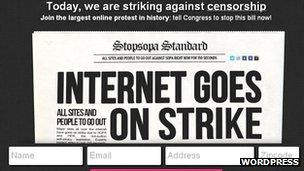Viewpoints: Sites go offline in US piracy laws protest
- Published

Visitors to WordPress are asked to add their names to an anti-Sopa petition
A number of high-profile websites took part in "blackouts" on Wednesday to protest against two bills being considered by Congress to tackle copyright infringement.
The House of Representatives' Stop Online Piracy Act (Sopa) and the Senate's Protect Intellectual Property Act (Pipa) are designed to block access to sites containing unauthorised copyright material.
Content owners would be given the power to request court orders to shut down sites associated with piracy, and advertisers and ISPs would be forbidden from doing business with infringers based overseas.
Sopa would also require search engines to remove suspect foreign sites from their results.
A more detailed explanation of thebills can be read here.
The English-language site of Wikipedia, the user-generated news site Reddit and the comedy website network Cheezburger took part in the protest.
The WordPress blog system also took its homepages offline andurged the owners, externalof the 70.4 million sites that use its service to join in.
The BBC asked some of the parties involved in the dispute to explain their positions.
Jimmy Wales, Wikipedia
At Wikipedia we are very strong defenders of freedom of speech and the open internet. We believe that if you want to combat piracy then measures that ask search engines to delist things or DNS services that block things are the wrong approach.
The right approach is to follow the money. To go after the people who are engaging in large scale criminal enterprises rather than burdening the entire internet with a regime that doesn't have very much promise of working.
And things could get really bad if we get into a situation where some of the worst burdens of these rules go through.
We have strong indications from venture capitalists that they would find it hard to invest in new start-ups in the user-generated content space.
Certainly innovations like Wikipedia would become very difficult if it were necessary for us to police everything that users were doing against some blacklist of websites.
In the worst case scenario we could have a situation where the US creates a Chinese style firewall in which sites can get blacklisted merely on an accusation. Some of the variations of the bill make it a little harder to get blacklisted, but in general we just think the entire approach is the wrong one.
Bad US law affects people all around the world. Look at the case of Richard O'Dwyer [the British student who created TVShack - a site which provided links to other pages containing pirated material].
The young man is being threatened with extradition to the US over alleged violations of US copyright law even though he lives in the UK and everything he did was on servers based in the UK.
A big part of Sopa is about dealing with overseas websites. That will have a huge impact on the very exciting UK IT internet start-up scene if it becomes likely that on a single complaint from a US movie studio some promising young British firm would be shut down.
We think it is a global issue because the US has such a strong impact on the internet.
Many of the supporters of this bill portray those of us who are against it as being somehow pro-piracy.
That is absolutely false. We are pro-freedom of speech.
Many of us, including me personally, are quite anti-piracy. I just want to fight piracy in a way that will really work and make a real difference.
Mr Wales is the co-founder and promoter of Wikipedia
Matt Mullenweg, WordPress

I've built my life on a free and open internet. As the co-founder of WordPress.org, a free software project that aims to democratise publishing, and the founder of Automattic, the company behind WordPress.com that hosts blogs from around the world in pursuit of the same goal, the proposed US legislation to regulate and censor the free and open foundation of the internet makes my mouth go dry with fear.
The rise of the web over the past two decades and the freedom to publish and express yourself online will be looked back upon as a cultural revolution.
We have gone from a world split between gatekeepers and media "consumers" to a world in which anyone regardless of geography, finances, social class, race, gender, or any other demographic identifier is free to engage with the rest of the world on their own terms.
That freedom is of paramount importance and must be protected.
That's why we're blacking out our websites on the 18th to raise awareness of this issue, and giving our users tools to do the same.
The tech world is fiercely competitive and companies seldom agree on anything, when you see so many united in solidarity on a single issue, you know there's something to it.
What concerns me the most about Sopa and the Protect IP Act is not that media companies and legislators want to have measures in place to protect copyright - for example we reply to and comply with DMCA (Digital Millennium Copyright Act) takedown notices on WordPress.com when we receive them, it works well for everybody - it's that the authors of the legislation don't seem to really understand how the internet works.
The definition of domestic versus foreign sites shows a woeful lack of comprehension about how domains are used and how traffic flows on the internet.
Where do I stand? On the side of publishing freedom.
What do I hope for? That these pieces of legislation be set aside, and that any future legislation in this arena be drafted by people who understand how the internet works - and how it won't if they do the wrong thing.
Mr Mullenweg is the founding developer of WordPress
Michael O'Leary , Motion Picture Association of America

There is a growing problem that entertainment and technology companies face across the world: rogue websites that profit from stolen content and counterfeit goods.
Many countries have taken reasonable measures to target this activity. Intellectual property laws have allowed commerce, innovation and free speech to flourish on the Internet.
In the United States, criminal websites located in other countries are engaging in destructive behaviour but are currently beyond the reach of our courts and law enforcement agencies. So, there should be nothing controversial about taking measures to limit the access of these foreign rogue websites - that engage in behaviour that is illegal for domestic websites - to American consumers and the American market
Measured legislation, the Stop Online Piracy Act and the Protect IP Act, has been introduced in Congress to address rogue websites and has been modified to address the concerns of the technology industry.
The importance of this legislation is evident in its broad support. It has the rare bipartisan support of Democrats and Republicans, the AFL-CIO (American Federation of Labor and Congress of Industrial Organizations) and Chamber of Commerce as well as a large coalition of businesses, unions, law enforcement officials and elected leaders from across the country.
The bills will encourage innovation while preserving millions of jobs that depend on intellectual property protection, including about 2.2 million Americans whose jobs depend on the film and television industries.
Unfortunately, opponents of the legislation have resorted to attacking the legislation without engaging in a real discussion of the provisions of the bill. Hopefully, this is not a stalling tactic to avoid targeting these foreign rogue websites and the profits they create for American companies that facilitate their illegal behaviour.
Recently, the Obama Administration stated that it looks forward to working with all parties to pass legislation this year to combat foreign piracy. All industries should work together to pass the legislation.
Every day that Congress fails to act on the legislation, American jobs are at risk and more consumers are vulnerable to criminal and malicious behaviour.
Mr O'Leary is the MPAA's senior executive vice-president of global policy and external affairs.
Steve Tepp, US Chamber of Commerce

The controversy around the Protect IP and Stop Online Piracy Acts (Pipa and Sopa) has certainly gotten a lot of attention. We'd be concerned, too, if only the hyperbolic claims being thrown around actually pertained to these bills.
As it stands, there is a disconnect between the actual contents of the legislation and the claims being made against them.
Last week, both Senator Leahy and Congressman Smith, in a good-faith effort to address the concerns raised about the bill, announced they would roll back the provisions of these bills designed to block foreign criminal websites, striking a major conciliatory note with those who raised legitimate concerns.
That was on top of the changes that guarantee the bill applies only to foreign sites.
What remains are two pieces of legislation that are narrowly tailored and commercially reasonable for taking an effective swipe at the business models of rogue sites.
To those who are familiar with the legislation, the claims for potential of censorship, breaking the internet, and lack of due process have left us scratching our heads.
Both bills include narrowly tailored definitions of rogue sites, targeting the worst of the worst online counterfeiters and pirates.
The bills say only the Department of Justice can initiate a full and comprehensive federal court process to obtain a court order to ask payment processors, ad networks, and search engines to cut off their services to these illicit websites.
The victims of rogue sites are given an opportunity to bring a case at their own expense, with no possible chance to recover any money whatsoever, and an even more limited set of remedies. Further, an extensive checklist of due process and checks and balances are ensured to protect from potential misuse.
These bills are critically important and needed now. Our economy is hurting as we watch foreign counterfeiters and pirates recklessly chop away at our creative industries and the more than 19 million people they employ.
And rogue sites harm consumers with websites that look authentic, but in fact sell fakes like clothing, electronics, and medicine that are often shoddy and sometimes dangerous.
How big is this problem? Rogue sites garner over 53 billion visits a year.
Enforcement of intellectual property has yet to reach the 21st Century: Pipa and Sopa help plug this massive loophole.
We all recognise that theft is not a free market principle, which is why IP thieves are not allowed to flourish in the physical marketplace. We applaud our enforcement agencies for taking a hard stance on counterfeiters in the brick and mortar world, but they frankly lack the tools to apply existing laws to our digital storefronts.
What cannot be done is to do nothing. Indeed, there is broad consensus that something must be done to address online counterfeiting and piracy, which already costs the global economy $650bn (£432bn) annually.
Supporters and sponsors of the legislation have made a good faith effort in addressing reasonable concerns while constructing and amending the bills.
Mr Tepp is chief intellectual property counsel for the Global Intellectual Property Center at the US Chamber of Commerce
- Published18 January 2012
- Published8 March 2012
- Published8 March 2012